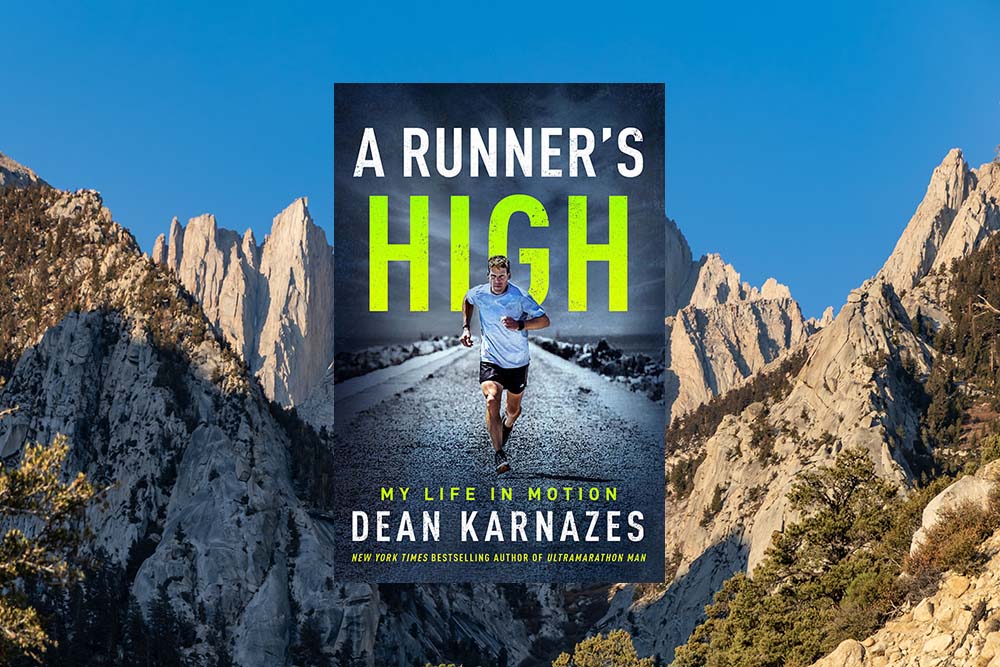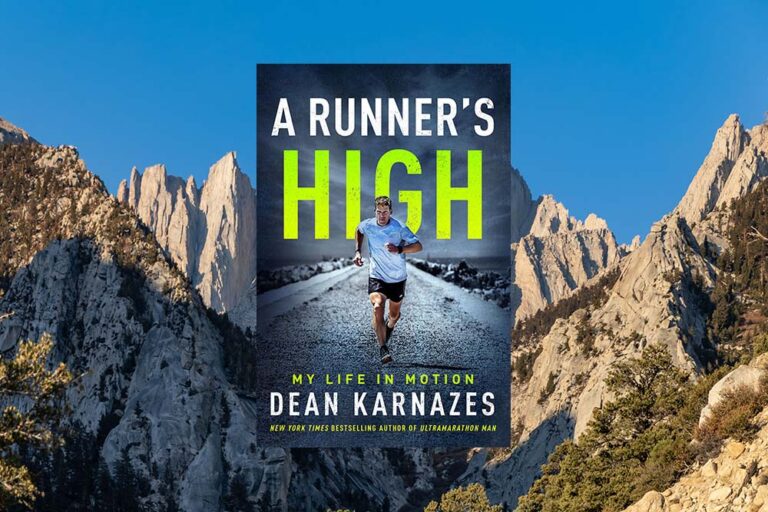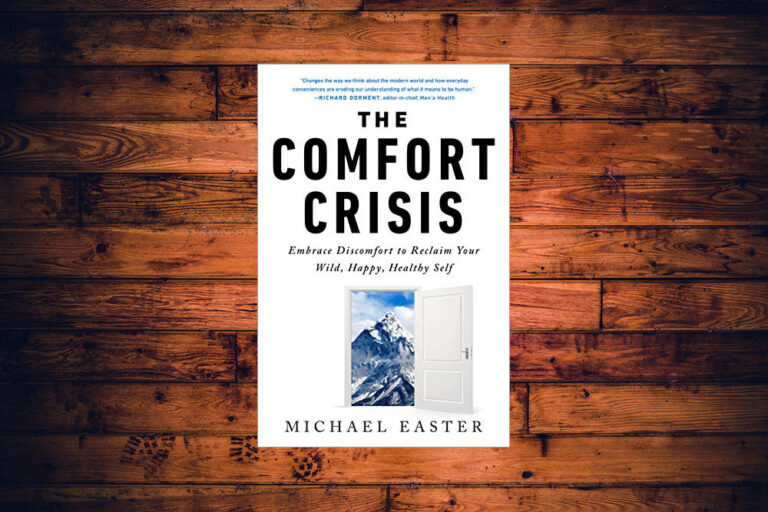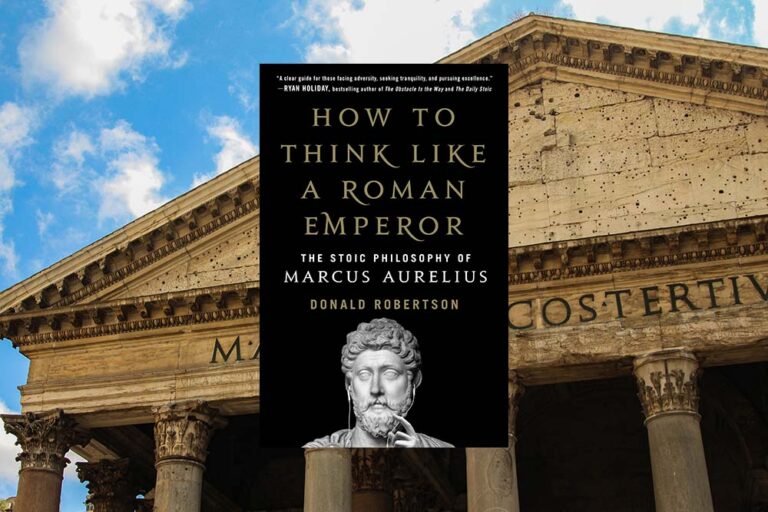#18: The Inner Game of Discomfort. Lessons From Dean Karnazes’s Memoir “A Runner’s High” (Part 1)

Dean Karnazes is one of the world’s most recognized ultra-marathoners. Named by TIME magazine as one of the “100 Most Influential People in the World,” Dean has an unbelievable track record.
Among his accomplishments are:
- running 50 marathons, in all 50 US states, in 50 consecutive days,
- running 350 miles (560 km) in 80 hours and 44 minutes without sleep,
- on ten separate occasions, running a 200-mile relay race solo, racing alongside teams of twelve,
- participating in the first South Pole marathon in −13 °F (−25 °C) temperatures without snowshoes,
- winning the Badwater Ultramarathon (135 miles/217 km) across Death Valley in 120 °F (49 °C) temperatures and scoring several more top10 finishes.
In his memoir A Runner’s High: My Life in Motion, he chronicles his return to the Western States 100-Mile Endurance Run in his mid-fifties after first completing the race decades ago.
Dean explores the topic of pushing his limits as he confronts his advancing age and deteriorating fitness performance. He also dives into his relationship with discomfort and how doing hard, uncomfortable things helped him better understand himself.
In today’s issue, inspired by Dean’s ultra-running experience, we’ll focus on the inner game of discomfort: honest self-reflection, exposing your weaknesses, non-conformity, and more.
Embark on a Journey Inward
To me, running is a grand adventure, an intrepid outward exploration of the landscape and a revealing inward journey of the self. These are the things that keep me going, the lust for exploration and the quest to better comprehend who I am and what I’m made of.
Having an everyday activity that promotes introspection is essential for every man. As we engage in a task that consumes our senses, we enter a trance. In such a state, we’re pausing the world for a moment while we reflect on ourselves: our choices, our values, our weaknesses, our plans.
For Dean, running gives him an opportunity to look inward. As he explores the world on his feet, he sees not only what’s outside but more importantly, what’s inside.
For you, it doesn’t have to be running. It may be hiking, writing, surfing, meditation, cycling, or studying philosophy. Whatever it is, we all need a daily activity that helps us self-reflect.
Sometimes contemplation is the hardest thing you can do because it forces you to examine your ugly spots and face your inner demons.
Expose Your Inner Self
The trail just kept going up and up, disappearing forever into the sky. The air was oppressively still, void of any headwind, tailwind, or crosswind—no movement whatsoever. I slogged along, the dust from my feet wafting languidly the way hot gas bubbles up from a lava field. There was no hiding from the elements, no possibility of deflecting the rays of energy or shielding myself from the sun’s electromagnetic emissions. I was exposed and vulnerable, a settler that’d strayed from the wagon train and gotten himself into trouble.
These are the moments I live for. Perhaps no other sport holds a mirror to you the way running does. Running exposes your inner self with unvarnished brutality. How do you respond when the tide turns against you? What do you do when the going gets tough? It’s been said that without war we do not know if we are cowards or heroes. The runner knows this truth, for the runner has waged war.
Ultra-running is an extreme sport both for the body and for the mind. Ultra-runners go well beyond the point of exhaustion, breaking themselves down to the shreds of consciousness.
When Dean runs long distances over endless hours, he’s on two concurrent journeys. The first journey is the physical one, the realm of his body. It’s where his physical training matters, where proper nutrition and hydration is key, where the right pace is essential to success. As a run progresses, his body is being put to the test.
The second journey is his inward journey. It’s the contemplation Dean engages in during those endless hours. It’s the process of questioning himself when he’s struggling. It’s finding the remaining slivers of strength to keep going when he can barely move. As a run progresses to the point the body refuses to continue, it’s the mind that’s being put to the test.
Each time Dean challenges himself, he comes away with new lessons about himself. The tough runs expose it all. It’s in these moments that Dean finds the truth. Sometimes he discovers inner courage. And sometimes his weaknesses get the best of him, as even the world’s greatest ultra-runners can and do occasionally break.
I’ve never run any ultra races but I’ve put myself in situations where I waged a war against myself. In some, I emerged victorious. In some—the truth is important to admit—I was a coward who was broken.
One experience that I vividly remember to this day that broke me was a wilderness first aid course.
The weather didn’t cooperate from the moment the course started. It was cold, humid, and rainy. I was soaked within the first hour. To make it more realistic, for the duration of the entire course we camped in the forest.
My friend and I had an old tent. We failed to properly isolate it from the wet ground. Needless to say, it was a miserable place to sleep in.
To up the ante, I had decided not to eat anything during the two and a half days of the course (every student was supposed to bring his own food). Big mistake number two. Fasting makes you feel cold. That’s not a big issue when you’re comfortable at home but a big fucking deal when you’re camping soaked in a bone-chilling, humid forest.
As the course went on, I grew colder and colder. I put on every single article of clothing I had (two pairs of socks, two pairs of pants, two t-shirts and a long sleeve, a fleece, a soft shell jacket and a hard shell jacket) and I was still shivering. At night, it was so cold and wet that it was hard to sleep.
During the day, as we practiced our skills in simulated wilderness accidents, I soon disengaged, doing the least I could do to conserve my energy. It felt as if the wet and the cold held my soul hostage. As an introvert, my energy was further sapped by spending the entire time with a group of 20+ people.
During theory classes conducted in a tent spacious enough to hold all the students, I positioned myself by a gas heater to warm up a little before another excursion to the cold, humid forest. (I swear, I’d have strangled anyone who dared take my spot by that heater.)
It never helped much. The moment we left the relative warmth of the big tent, I was cold and miserable again.
By the second night, our tent was completely soaked (since it rained almost non-stop). I was ready to quit and hike back to my car. Right before we were about to call it a day (and I was about to pack my stuff and leave), our instructors told us to take down our tents. We went on another simulation carrying all the equipment with us. By the time we finished, it was late night and we were allowed to sleep in the big tent.
I wanted to be warm so much that at first I positioned my sleeping bag too close to the heater and it left some burn marks on it. Still, holes in my sleeping bag or not, not having to sleep in our soaked tent saved my sanity for that last night.
But on the last day, I was broken anyway. I opted out of one of the final challenges when we were told to practice injections by self-injecting a saline solution in the thigh. My mind wanted nothing to do with further challenges. All I wanted was for the course to be over. I wanted to be dry and warm again.
That’s where I learned how the combination of being cold and wet massacres your spirit. This is how Navy SEAL candidates are broken, too. They’re purposefully being kept wet and cold all the time. The instructors know how this combination results in overpowering physical anguish that kills all your resolve.
I don’t regret my experience because it exposed my inner self. And ultimately, that’s what we’re after: the ugly truth of who we are, where our limits lie, and what we can do better to excel. I failed the test that day but it has strengthened me nonetheless.
Pay Attention to Your Inactions
Our actions in life ultimately shape who we are, though perhaps our inactions exert more of an everlasting influence. Many people are not happy with what they do, yet possibly worse, many people simply tolerate what they do and never take the initiative to do anything about it. Either out of fear, complacency, or sheer exhaustion, they go through the motions day after day of living a life that is less than what they’d hoped. Inaction becomes permanent, and suddenly it’s too late. Perhaps the only tragedy approaching that of a young life cut short is a long life left unlived.
Dean suggests that the actions we don’t take may have a bigger influence on our lives than the actions we do take.
For example, tolerating a job you hate or accepting your poor level of fitness has a far-ranging impact on your entire life. It’s not just about your career or your physical ability: it’s about your standards and expectations.
If you let your life unfold the same disheartening way every day, eventually these frustrations become a permanent fixture. You become a slave to your inertia.
One day you look back and realize that years, if not decades, have passed without living your life the way you’ve always wanted to.
If your life is less than what you hoped it would be, admitting this fact is the first step to change it. So many men live passive, unhappy lives because they try to convince themselves their situation isn’t so bad instead of figuring out how to fix it.
No matter how much dirt you throw at the truth, it’s always there, waiting to be unearthed one day. If you don’t want it to be the day you’re on your death bed, ask yourself some uncomfortable questions today.
Your starting point: what is one thing you hate about your life that you’ve been tolerating for too long—or worse, pretending you don’t hate it and that it’s not that bad?
Navigate Your Own Course
I saw this eerie contented discontentment all around me when I was younger working at a large corporation, and it scared the hell out of me. People were simply showing up to work and making it through to the end of the day, and every two weeks collecting a paycheck. I didn’t know the definition of success, but this didn’t seem like it to me. Even a life that was a failure seemed better than a life that was empty. Sure, to dare is terrifying, though the alternative was something worse. Dying, to me, seemed like a better alternative than not fully living.
Thus I decided to navigate my own course through life. This is what a nonconformist does, really. Those who set out on their own can’t follow a path less traveled, because there is no path to follow. It’s largely orienteering without a compass, sometimes finding a clearing that makes the journey more effortless, but mostly bushwhacking through the thicket. Everyone’s unique calling was different; there were no preset GPS coordinates.
Dean’s sentiments on living a full life remind me of Seneca the Younger who said:
We are not given a short life but we make it short, and we are not ill-supplied but wasteful of it… Life is long if you know how to use it.
When Dean talks about the people showing up to work only to make it through to the end of the day, that’s an example of someone who’s wasteful of their limited time. From the perspective of striving to have an exceptional life, knowing we don’t get another crack at it, an empty life of a conformist is no life at all.
Non-conformity is one of the most powerful traits a man can have. As a non-conformist, you reject the lazy choice of accepting someone else’s standards as yours and instead choose your own path. Or in other words, you’re a leader of your own life instead of a follower of someone else’s life.
I like how Dean puts this journey as bushwhacking through the thicket. This implies a more difficult trek but a more eventful one, too. Such an expedition gives you a full, rich life, in pursuit of your own unique calling.
A man following a beaten path may have it easy. The road is smooth, without any protruding roots, rocks, or holes to fall into. But is it a path worth following if the only thing it offers is security, without excitement, adventure, or even a little bit of character-forming suffering?
Express Yourself Through Your Challenges
To me, running was about more than speed and ranking. The medium wasn’t confined to the racecourse, and the “best” runner wasn’t always defined as the fastest runner. Professional surfer Phil Edwards had once famously quipped, “The best surfer is the one having the most fun.” For some individuals, running went beyond racing. These folks seemed to extract an inordinate amount of joy from running, the pavement and trails becoming their canvas, and they painted a picture that was both colorful and deeply personal. In their wanderings, running was a creative expression that led them to unexpected places and startling encounters. While racing is a sport, their running was more akin to art.
People such as Rickey Gates, Katie Visco, and Charlie Engle were the beatnik poets of running, and they did things like running self-supported across America, running from the sea to the summit of the highest peak on all continents, and running across Australia. Their pursuits were adventurous and inventive, like a different form of running. I’d embarked on a few of these types of expeditions and loved the freedom and originality such endeavors afforded. You got to make up a starting line and the finish line, plus everything in between.
Dean advocates looking at your challenges as an art form. Sure, there’s nothing wrong with a more “ordinary” goal like trying to do 100 push-ups in a row. But why not make things more interesting?
In one of the first articles, I covered the idea of misogis explained in Michael Easter’s book The Comfort Crisis: short but hard voluntary challenges.
One of the misogis mentioned in the book was carrying an 85-pound (38.5 kg) rock 3.1 miles (5 km) underwater along the coast of Santa Barbara Island. A team of participants rotated as each dived a few feet to the bottom to pick up the rock and walk with it across the ocean floor as far as he could.
It was a quirky and memorable challenge that expressed the creativity of the person who came up with it.
What cool accomplishments could you pursue to express your creativity and test your mettle?
If you can’t come up with any ideas, use Ross Edgley as an inspiration. He swam around Great Britain in 157 days, completed an Olympic distance triathlon carrying a 100 lb (50 kg) tree, ran a marathon pulling a 3,100 lb (1,400 kg) car, and completed the world’s longest rope climb of 8,848 meters (29,029 ft), the height of Mt. Everest.
His athletic accomplishments may not be traditional or officially-recognized in established races but they sure are fun and creative.
Carry On Even If Things Don’t Go Your Way
This wasn’t the race I wanted, not the performance I’d been hoping for. Of course, I hated that. No one wants to fall short of his expectations, and it stung. Though what defines us as individuals is not that we encounter hardship—for everyone does—but how we carry ourselves in such instances when things don’t go our way. “There is timing in the whole life of the warrior, in his thriving and declining, in his harmony and discord,” the samurai poet Musashi Miyamoto wrote. Like the tides washing in and flowing out, no glory is everlasting. What matters most is having the courage to carry on, fully aware of the tides through which we move, flourishing with dignity and receding with honor, forever dutiful to being all that we can be throughout the cycle.
Sometimes giving your best is not enough. Unexpected adversity or a bad day can lead to a disappointing performance. But there’s no shame in it as long as you carry on to the best of your ability.
Even the world’s most exceptional men fail. But what defines failure isn’t failing to get the performance you want. What defines failure is backing out because things don’t go your way. When you quit because you can’t accept the tides of life, you betray yourself and the cause you believe in.
A surgeon may not save every patient but it doesn’t mean he should stop trying to help save lives.
A firefighter may not save every victim but it doesn’t mean he should give up his vocation.
An aging athlete may no longer be able to compete against younger contestants but it doesn’t mean he should stop racing.
Dean wasn’t happy with his performance but he pressed on. The race was irrelevant. He was running to compete with himself. After he finished the race, he thought:
If death were to befall me at this moment I would have no regrets, for it would be, as the Greeks say, kalos thanatos, a beautiful death. I’d become the man I was meant to be. There needn’t be more.
Questions to Ponder
1. Do you regularly engage in an activity that helps you self-reflect?
2. When was the last time you put yourself in a situation that exposed your inner self?
3. What inactions of yours have a big impact on your life? Why haven’t you taken the initiative to do something about them yet?
4. Are you navigating your own course through life or following someone else’s beaten path?
5. How could you express yourself through your challenges? What difficult, creative feats—physical or mental—could you pursue to have an exciting and original adventure?
6. How often do you give up because things don’t go your way and you’re unsatisfied with your performance?
If you want more advice on how to become a better man through discomfort, sign up for a free weekly Discomfort Club newsletter. Enter your email address below:






